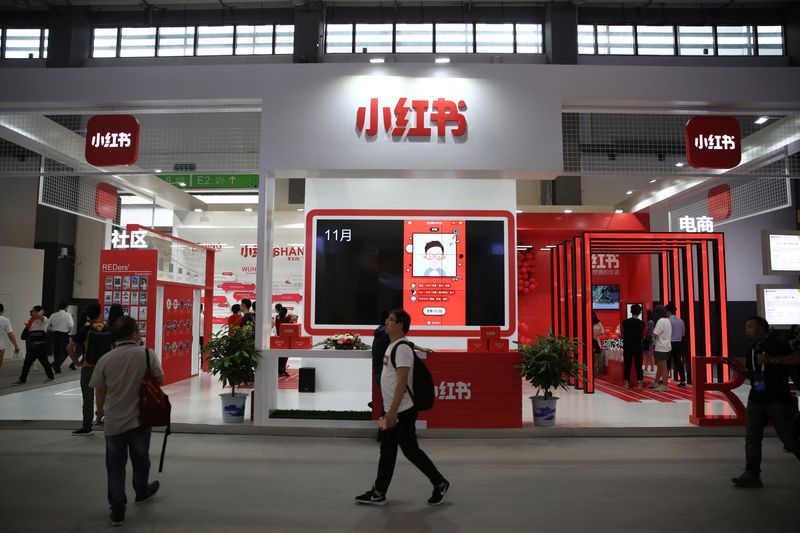
By Casey Hall
SHANGHAI (Reuters) – Since Tera Feng began documenting her enviable lifestyle in Shanghai, including visits to art galleries and fashion events, on Chinese social media eight years ago, she has gained a follower base of more than 500,000 people.
While this represents a drop in the ocean of China's consumer market, Feng and the brands she works with have found that her audience — especially financially independent, urban Chinese women — are willing to spend.
A recent switch to direct selling on the social media platform Xiaohongshu three months ago led to Feng selling everything from a 15,000 yuan ($2,060) Carven suit to her favorite brand of rice that costs 60 yuan for a 1-kg bag.
Xiaohongshu, sometimes compared to Instagram, has long been one of China's most important marketing tools. It has made several pushes into e-commerce over the past decade without much success.
But now, consultants say brands, especially those that sell niche and upscale products, are finally seeing big sales this year amid a tough retail environment.
While retailers were forced due to consumer pressure to make deep discounts on other e-commerce platforms such as Alibaba (NYSE:)'s Taobao and PDD Holdings' Pinduoduo (NASDAQ:), Xiaohongshu's focus on aspirational lifestyles attracts less price-sensitive users.
“Brands really appreciate following Xiao Hongshu's platform, because the consumption power is completely different” from other platforms, said Suya Wang, general manager of Early Data, a Shanghai-based consulting firm.
While some brands including L'Oreal and Tapestry (NYSE:). trainer Many brands have opened their own stores on the platform, and many brands are also investing in partnerships with influencers who live stream a selection of products from multiple brands and categories.
“There's a better chance of us being discovered by the right consumers because that's where people go to look for lifestyle products geared toward women,” said Melody Zhao, an investor in menstrual care brand Enya. She added that Xiaohongshu's e-commerce will be a priority for the brand's entry into the market early next year.
Xiaohongshu was late to China's live streaming sales boom led by Alibaba's Tmall and ByteDance's Douyin, but in 2022 it merged its e-commerce and live streaming divisions, and integrated purchasing functions into live streaming.
Influencers who live stream on Xiaohongshu tend to use a calmer, conversational tone when speaking to viewers, which sets them apart from the fast-talking, energetic hosts on other platforms that use aggressive sales tactics.
Ian Hilton, president of Ms Min, an independent Chinese brand that sells knitted sweaters for more than 5,000 yuan, said they were surprised by the sudden growth in sales of Xiaohongshu after they appeared on a live broadcast hosted by Chinese actress Dong Jie.
“We never treated Xiaohongshu as a platform to sell, but rather a place to tell our stories and raise brand awareness,” he said. “But when Dong Jie talks about Ms. Min, we can sell hundreds of units of an item after one live broadcast,” Hilton said.
Evan Guo of Magic Advertising, an agency that manages social media and e-commerce operations for luxury brands, said many of his clients, including Max Mara and LVMH, were looking more seriously at Xiaohongshu as a sales driver.
Plans, which are still in the works, include opening stores and running more live broadcasts, or setting up sales partners for brands as live broadcast hosts on the platform, a phenomenon known as KOS – or key opinion sales – in China.
“Triple-digit gains”
Xiaohongshu, whose name translates to “little red book,” is similar to Meta's (NASDAQ:) Instagram app in that it allows users to organize photos, videos, and texts that document their lives. In recent years, it has also become a de facto search engine for young women looking for travel tips, anti-aging creams and restaurant recommendations.
The company, a private company with more than 300 million users and valued at $17 billion after its latest funding round in July, declined interview requests from Reuters and did not respond to questions about its sales revenue. Hongshan (formerly Sequoia China), Hillhouse, Boyu and Citic Capital are among Xiaohongshu's investors.
Xiaohongshu has remained largely quiet about its e-commerce strategy, but Jacob Cook, CEO of e-commerce consultancy WPIC Marketing + Technologies who works with brands looking to join the platform, said it has been hiring away from rivals Alibaba and Douyin. ByteDance's subsidiary is evidence of its ambition.
“We expect triple-digit gains in GMV (gross merchandise volume, a measure of sales) on Xiaohongshu next year,” Cook said, estimating that the platform will exceed $100 billion in sales revenue in 2025.
However, others say Xiaohongshu will likely remain niche as an e-commerce player and does not pose a real threat to larger platforms.
Tmall, JD (NASDAQ:.com) and Pinduoduo, China's three largest platforms, account for more than 90% of the country's total market value of $2.78 trillion, according to data consulting firm Syntun.

“Compared with large platforms, their total volume is very small, so they do not have much influence on the platform,” said Li Chengdong, a Beijing-based technology and e-commerce analyst.
($1 = 7.2768 RMB)







